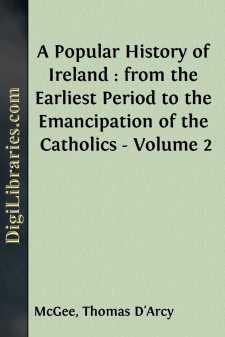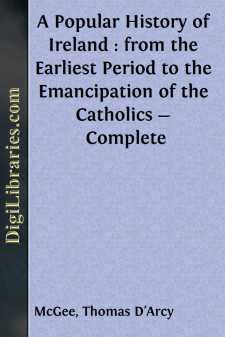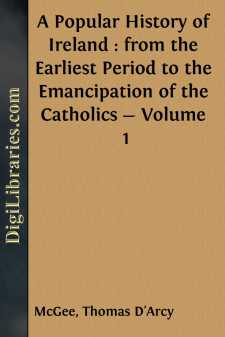Categories
- Antiques & Collectibles 13
- Architecture 36
- Art 48
- Bibles 22
- Biography & Autobiography 813
- Body, Mind & Spirit 142
- Business & Economics 28
- Children's Books 17
- Children's Fiction 14
- Computers 4
- Cooking 94
- Crafts & Hobbies 4
- Drama 346
- Education 46
- Family & Relationships 57
- Fiction 11829
- Games 19
- Gardening 17
- Health & Fitness 34
- History 1377
- House & Home 1
- Humor 147
- Juvenile Fiction 1873
- Juvenile Nonfiction 202
- Language Arts & Disciplines 88
- Law 16
- Literary Collections 686
- Literary Criticism 179
- Mathematics 13
- Medical 41
- Music 40
- Nature 179
- Non-Classifiable 1768
- Performing Arts 7
- Periodicals 1453
- Philosophy 64
- Photography 2
- Poetry 896
- Political Science 203
- Psychology 42
- Reference 154
- Religion 513
- Science 126
- Self-Help 84
- Social Science 81
- Sports & Recreation 34
- Study Aids 3
- Technology & Engineering 59
- Transportation 23
- Travel 463
- True Crime 29
A Popular History of Ireland : from the Earliest Period to the Emancipation of the Catholics - Volume 2
Description:
Excerpt
Sir Henry Sidney, in writing to his court, had always reported John O'Neil as "the only strong man in Ireland." Before his rout at Lough Swilly, he could commonly call into the field 4,000 foot and 1,000 horse; and his two years' revolt cost Elizabeth, in money, about 150,000 pounds sterling "over and above the cess laid on the country"—besides "3,500 of her Majesty's soldiers" slain in battle. The removal of such a leader in the very prime of life was therefore a cause of much congratulation to Sidney and his royal mistress, and as no other "strong man" was likely soon to arise, the Deputy now turned with renewed ardour to the task of establishing the Queen's supremacy, in things spiritual as well as temporal. With this view he urged that separate governments, with large though subordinate military as well as civil powers, should be created for Munster and Connaught—with competent Presidents, who should reside in the former Province at Limerick, and in the latter, at Athlone. In accordance with this scheme—which continued to be acted upon for nearly a century—Sir Edward Fitton was appointed first President of Connaught, and Sir John Perrott, the Queen's illegitimate brother, President of Munster. Leinster and Ulster were reserved as the special charge of the Lord Deputy.
About the time of O'Neil's death Sidney made an official progress through the South and West, which he describes as wofully wasted by war, both town and country. The earldom of the loyal Ormond was far from being well ordered; and the other great nobles were even less favourably reported; the Earl of Desmond could neither rule nor be ruled; the Earl of Clancarty "wanted force and credit;" the Earl of Thomond had neither wit to govern "nor grace to learn of others;" the Earl of Clanrickarde was well intentioned, but controlled wholly by his wife. Many districts had but "one-twentieth" of their ancient population; Galway was in a state of perpetual defence. Athenry had but four respectable householders left, and these presented him with the rusty keys of their once famous town, which they confessed themselves unable to defend, impoverished as they were by the extortions of their lords. All this to the eye of the able Englishman had been the result of that "cowardly policy, or lack of policy," whose sole maxims had been to play off the great lords against each other and to retard the growth of population, least "through their quiet might follow" future dangers to the English interest. His own policy was based on very different principles. He proposed to make the highest heads bow to the supremacy of the royal sword—to punish with exemplary rigour every sign of insubordination, especially in the great—and, at the same time, to encourage with ample rewards, adventurers, and enterprises of all kinds. He proposed to himself precisely the part Lord Stafford acted sixty years later, and he entered on it with a will which would have won the admiration of that unbending despot. He prided himself on the number of military executions which marked his progress. "Down they go in every corner," he writes, "and down they shall go, God willing!" He seized the Earl of Desmond in his own town of Kilmallock; he took the sons of Clanrickarde, in Connaught, and carried them prisoners to Dublin. Elizabeth became alarmed at these extreme measures, and Sidney obtained leave to explain his new policy in person to her Majesty. Accordingly in October he sailed for England, taking with him the Earl and his brother John of Desmond, who had been invited to Dublin, and were detained as prisoners of State; Hugh O'Neil, as yet known by no other title than Baron of Dungannon; the O'Conor Sligo, and other chiefs and noblemen. He seems to have carried his policy triumphantly with the Queen, and from henceforth for many a long year "the dulce ways" and "politic drifts" recommended by the great Cardinal Statesman of Henry VIII. were to give way to that remorseless struggle in which the only alternative offered to the Irish was—uniformity or extermination. Of this policy, Sir Henry Sidney may, it seems to me, be fairly considered the author; Stafford, and even Cromwell were but finishers of his work. One cannot repress a sigh that so ferocious a design as the extermination of a whole people should be associated in any degree with the illustrious name of Sidney....




